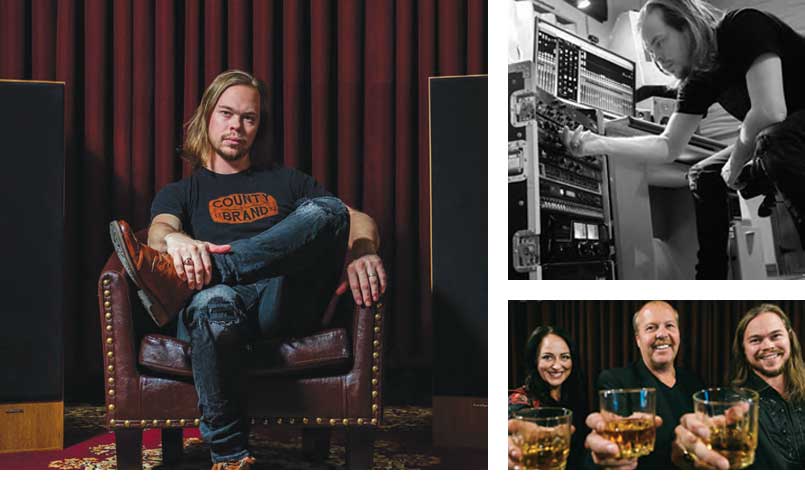
clockwise from left to right: Caleb in the studio; celebrating with sister Megan and Steve Van Dusen
Prince Edward County’s Solar-powered Production Studio
The unfarmed, wooded acres situated deep into every parcel of land allocated to County farmers in 1872 were often referred to by their owners as “the back forty.” For the most part, this land was shaded under a heavy tree canopy, so when County-born Canadian recording artist Caleb Hutton made the decision to convert his entire Back Forty Productions studio to solar power – it felt kinda revolutionary. Caleb and his sister Meg carved out their place in the music industry while still in high school, when they became “Instant Rivalry,” an alt-rock-turned-country band that would go on to produce a number of records and live events. They soon achieved a reputation for their artist- and cause-driven collaborations. “I’ve always had a clear picture of recording and a sound,” Caleb says. “Meg and I used to record in studios and always had production issues, so I decided to turn our old jam space into a full-service studio.” The space was on his grandparents’ 150-year-old County farm, and the name, Back Forty Productions, was a tribute.
“Artists are always surprised to hear that they are working on a project that is completely solar-powered.” CALEB HUTTON
The decision to let the sunlight into Back Forty was a major step in the business’s evolution. Eight years before, Caleb began building the infrastructure to house podcasts and video development, but the unreliable local internet kept the expansion shelved.
Then in early 2019, things changed. The siblings struck up a friendship with Picton’s Steve Van Dusen, CEO of Tri-Canadian Energy (TCE) and Tri-Canadian Communications (TCC). “We believed in his business,” says Caleb, “and he believed in us.” They called on Tri-Canadian Energy to sponsor a youth music program that Instant Rivalry was producing with the Recreational Outreach Centre – it would be the first in a number of partnership projects together. That same year, Back Forty put on a completely solar-powered outdoor concert with TCE and began to make plans around Instant Rivalry’s new album release, Whiskey and Lead.
Steve Van Dusen had a vision of a solar-powered island, and that island was Prince Edward County. And it’s true, the pursuit of clean, renewable energy and opportunities to adopt it are two of the most critical topics of our time, and the County is as good a candidate as any. There are no corners of the globe that are immune to the effects of climate change, and positive action will as likely occur through choices made by individuals and small businesses as by large corporations.
“I visited Steve’s house in February of 2020 and had my first cup of solar-powered coffee,” Caleb remembers. “It wasn’t different in the way it tasted or looked, but something clicked, and the feeling I got from that cup of coffee was my first step to lowering my carbon footprint.” Soon, Back Forty Productions, TCE and TCC were partnering up to be the first 100% solar-internet and solar-powered recording studio.
“The world is changing and so is the music industry,” Caleb continues. “These days we can offer services that others can’t, and also leave a smaller carbon footprint.” The studio aims to change minds by modelling behaviour, and this refit was no exception. “We’ve always endeavoured to be a leader in the field. We were pushing back against the common perception of how music should be, while encouraging the artists we worked with to do the same.”
At first glance and listen, Back Forty looks just like any other recording studio. There are no cumbersome wires, solar panels or batteries in view. All the panels are on the exterior roof of the studio, feeding into an inverter outside that runs into the house and hooks up to the pre-existing fuse panel. “Artists are always surprised to hear that they are working on a project that is completely solar powered,” says Caleb, “or being streamed using solar high-speed internet – which is perfect.”
They were up and running very quickly. Instant Rivalry’s “Live from The Back Forty” streaming series was a perfect way for them to test out the solar set-up and the new software, and to begin building an online presence. Suddenly, the studio was in high gear and everything started happening. In the first three months Back Forty delivered 35 live streams, with two shows a week. They helped organize the local radiothon and then rounded up 20 artists to record a video in support of artists struggling with COVID restrictions. To finish off the year, they threw “A Back Forty Christmas Special” with The Wilkinsons, Instant Rivalry, Justin Rutledge, Russell deCarle of Prairie Oyster, Emily Fennell and other household names.
It’s an impressive roster. “Some of these artists have Maple Blues Awards under their belt,” Caleb says, “some have Junos, CCMA and CMA awards, and there’s also a Grammy nomination in there. We had over 60 different artists safely come through the studio over the year during a pandemic – solar energy gave us the power to do that. I want to do as much as I can for my family and leave my kids with a better future, a legacy of music and creation, and a positive message to everyone to try and do the same.”
If you count jumping through the waves at Sandbanks, beach blankets dotted on sandy dunes, picnics on the grass at Wellington Park and ice-cream strolls down Picton Main Street, it’s pretty apparent that the sun has actually been powering good things in Prince Edward County for as long as most of us can remember. But as our shores erode and lake levels rise, it’s become apparent that we need to take action on climate change. Action can look like a cup of off-the-grid coffee, it can look like growing your own vegetables, it can look like an entire island powered by the sun. Or it can look like an over-achieving production studio in Prince Edward County.
Story by:
Lonelle Selbo
Photography by:
Sean Ferguson Photography




